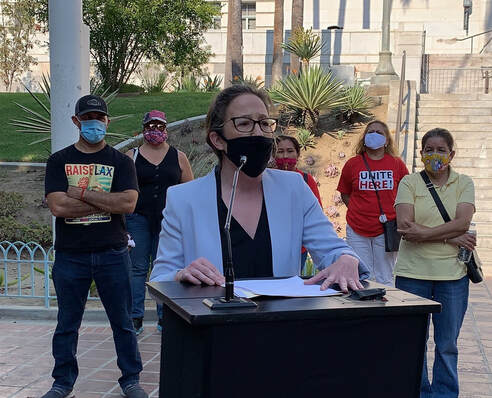|
On April 2, Teukolsky Law filed a class action lawsuit against Hotel Figueroa, alleging the hotel and its operators violated Los Angeles’s Hotel Worker Retention Ordinance when they failed to protect workers’ jobs after the hotel’s food and beverage operator, Noble 33, abruptly laid off all of its employees in February 2024.
The Hotel Worker Retention Ordinance was enacted to protect hotel workers affected by mass layoffs, which frequently occur when corporate ownership or management of a hotel changes. When employees are laid off following such a change, the Ordinance requires hotels and their operators to retain employees for a brief transitional period to ensure employment stabilization and reduce demands on social services. In the case of Hotel Figueroa, more than 100 workers lost their jobs after Noble 33 decided to cease operations at the hotel days after the staff notified management of their intent to unionize. Noble 33 was quickly replaced by a new operator, The Botanical Group, but the lawsuit alleges that none of its former non-management staff were retained, including Maria Ibarra, a former cook for Noble 33. Hotel Figueroa operates out of one of downtown Los Angeles’s most famous buildings, a 14 floor Spanish Mediterranean property that also houses upscale restaurants such as Café Fig and La Casita. The dispute at the hotel may be indicative of a broader Southern California trend of food workers standing up to their employers and alleging labor and employment law violations. For UNITE HERE Local 11’s press release on Ms. Ibarra’s lawsuit, click here. For more on Ms. Teukolsky and her practice, click here.
0 Comments
 Lauren Teukolsky was quoted by Bloomberg Law and Law360 in a pair of articles discussing the class action lawsuit Teukolsky Law filed Wednesday against Hyatt for violating a law meant to protect hotel cleaning staff from being overworked and underpaid. The lawsuit is believed to be the first in the country brought under a “housekeepers bill of rights” law. Ms. Teukolsky represents the plaintiffs along with Zoe Tucker of UNITE HERE Local 11. “Housekeeper’s bill of rights” laws broadly refer to laws created specifically to protect hotel cleaning staff from abuses at the workplace, including but not limited to wage theft and sexual harassment. The lawsuit filed by Ms. Teukolsky alleges that Hyatt violated the Long Beach Hotel Working Conditions Ordinance when it failed to pay hotel room attendants the required double wages they were owed for cleaning more than 4,000 square feet in a single day, among other violations. Laws similar to Long Beach’s have been passed in Los Angeles, Santa Monica, and Seattle, in what has become a national trend of local municipalities stepping in to protect workers when their states and the federal government fail to. Bloomberg Law’s article reads: “’The voters of Long Beach passed a hotel workload ordinance to guarantee hardworking room attendants a fair day’s wage for a fair day’s work,’ Teukolsky said in a statement. ‘As we say in the lawsuit, Hyatt has been flouting the law since the day it was passed.’” In the Law360 article, Ms. Teukolsky states the following : "Hotels are on notice that they can't cheat workers out of their wages with impunity.” To read the Bloomberg Law article in its entirety, click here. To read the Law360 article in its entirety, click here. If you believe that you have not been paid proper wages, click here to get in touch with our office.  Lauren Teukolsky was quoted in a Bloomberg Law article last week unpacking a wave of ongoing litigation prompted by Elon Musk’s mass layoffs at Twitter. The layoffs began in early November, following Elon Musk’s $44 billion acquisition of the social media giant. After taking over, Musk proceeded to fire half of Twitter’s workforce, asked some essential employees to return, rolled back its expansive work-from-home policy, and called on the remaining employees to sign a pledge to remain at an “extremely hardcore” Twitter or quit. Musk’s actions have prompted many of Twitter’s recently laid-off employees to pursue class action lawsuits against the company alleging violations of the Worker Readjustment and Retraining Notification (WARN) Act, a federal law, and its California equivalent, among other allegations. This, in turn, has led Twitter to require some employees to sign a release of legal claims against the company at the risk of not receiving severance pay, according to an amended complaint recently filed by ex-Twitter workers. Ex-Twitter workers have responded to Twitter’s move by requesting a protective order blocking the company from soliciting such releases and nullifying any it has already obtained. The article states: “The workers’ Nov. 9 request is based on a well-developed body of federal law analogous to the state law standards developed after a California appellate court’s 2009 ruling in Chindarah v. Pick Up Stix, Inc., said Lauren Teukolsky, a plaintiffs’ attorney with Teukolsky Law PC. ‘Many cases since Pick Up Stix have found releases to be invalid where the employer engaged in coercive or misleading tactics,’ Teukolsky said.” To read the article in its entirety, click here. If you have been affected by recent developments at Twitter, click here to get in touch with Teukolsky Law.  At a press conference on January 28, 2021, Lauren Teukolsky announced the filing of a new lawsuit against Chateau Marmont on behalf of former employee Thomasina "Thommi" Gross. Chateau Marmont is a legendary Hollywood hotel known as a playground for its wealthy clientele. Ms. Gross, who is African-American, worked as an events server there from 2017 to 2020, until she was laid off due to the COVID-19 pandemic. The complaint, which was filed on January 27 in Los Angeles Superior Court, alleges that Ms. Gross was repeatedly passed over for promotions in favor of white employees. Ms. Gross, who had over a decade of experience in high-end hotel hospitality, received far less compensation and fewer hours than her white counterparts. This was consistent, says the complaint, with the Chateau’s discriminatory preference for placing white or light-skinned people of color in guest-facing roles. The suit also alleges that due to the Chateau’s “anything goes” party environment, guests felt free to touch and grope Ms. Gross as she served food during events. When Ms. Gross reported guest misconduct to management, the complaint alleges, they took no steps to protect her, and even retaliated by not giving her any more restaurant shifts. Ms. Teukolsky said: “Ms. Gross has demonstrated tremendous courage by stepping forward to challenge the discriminatory practices of one of the most iconic Hollywood institutions. We hope that her bravery will lead the Chateau to take steps to protect its employees from guest harassment and to ensure that its hiring practices going forward comply with California’s powerful anti-discrimination laws.” In an article published on January 28 in the Hollywood Reporter, Ms. Gross commented: “I don’t like having to leave my dignity at the door. It’s exhausting. We’re forced into a fight-or-flight mode. We’re conditioned to believe we have to expect this. I’m speaking out on behalf of myself and others who believe they’ll face retaliation. Changing the culture is my focus. No one should have to deal with this on a day-to-day basis.” If you believe you have experienced racial discrimination or sexual harassment at work, contact Teukolsky Law today for a free consultation. Teukolsky Law Files New CLass Action Lawsuit Against HMS Host On Behalf of Laid-Off LAX Workers10/27/2020  On October 15, 2020, Lauren Teukolsky spoke at a press conference announcing a new class action lawsuit filed by Teukolsky Law against HMS Host, the largest operator of airport concessions in North America and at Los Angeles International Airport (LAX). HMS Host laid off almost 1,000 LAX workers in March and April 2020, including named plaintiffs Plaintiffs Debra Lewis, Marlene Mendoza and Lotus Perez-Silva, who each worked for HMS Host at LAX for more than 30 years, most recently as servers in Point the Way Café by Golden Road and Campanile, two LAX concessions operated by HMS Host. The lawsuit alleges that HMS Host failed to pay its laid-off workers wages they are owed under the Los Angeles Living Wage Ordinance. The lawsuit also alleges that Host failed to comply with California's "timely payment provisions" by waiting over six months to send laid-off workers their final paychecks for accrued vacation time. Law360, which covered the filing of the lawsuit, quotes Ms. Teukolsky as saying "that the workers have struggled because of the layoffs. 'The workers by and large have not been able to find other employment. Many of them have had to go on to unemployment benefits, and for many of our clients, they are having to make really hard decisions between paying rent, paying medical bills, getting groceries,' she said." On October 21, 2020, the week after the lawsuit was filed, the Los Angeles City Council unanimously voted down a relief and lease extension package that HMS Host was seeking, estimated to be worth tens of millions in lease extension-related revenue and rent relief for HMS Host. If you have been laid off and have questions about whether your employer paid you all of the wages you were owed, contact us today for a free consultation. Teukolsky Law, APC filed a class action lawsuit today against the luxury Terranea Resort in Rancho Palos Verdes, alleging that the hotel has subjected its workers to numerous wage-and-hour violations, including failure to pay them for all hours worked, the denial of meal and rest breaks, and failure to reimburse them for work supplies. Surrounded by hotel workers, Lauren Teukolsky announced the lawsuit along with named plaintiff Galen Landsberg at a press conference outside the oceanfront resort this morning.
The lawsuit claims that the resort regularly prohibits workers from parking in its onsite lots to make room for guests and requires workers to instead take company shuttles from remote off-site parking lots, but does not pay them for the additional travel time. Due to the high cost of rent in Rancho Palos Verdes, most workers commute to the hotel from more affordable parts of the Southland. Workers say the Terranea’s required use of company shuttles can add an hour or more to their already grueling daily drives. “Rancho Palos Verdes is not somewhere we workers can afford to live, so we drive long distances each day to get to work. I live in mid-City Los Angeles. It’s frustrating that, on top of the long commute, we have to come in early to take the company’s shuttles from the offsite lots and are not paid for this time,” said Galen Landsberg, a cook at the Terranea. Freddy Lovato, another Terranea cook, said: “I know the law says that we are supposed to be able to take two ten-minute rest breaks when we work an eight-hour shift. But that is not the reality. The kitchen is incredibly busy and we are regularly not permitted to take breaks.” The suit also alleges that the hotel fails to reimburse workers for such required tools as knives, sharpening stones, peelers, lemon juicers, kitchen scissors, spatulas, and graters at Terranea’s expensive restaurants. “Talk about nickel-and-diming,” said Ms. Teukolsky. “While guests pay upward of $30 or $40 for a single entrée, Terranea pockets the profits and requires their own employees to supply the tools that enable them to perform their jobs.” The Terranea, a Lowe Enterprises property, has become iconic in the upper echelons of the Los Angeles hospitality industry. The expansive property is located up the Pacific Coast from the Trump National Golf Course. With its ocean-side views and A-list clientele, the 5-star resort projects an image of luxury and environmental stewardship. |
AuthorLauren Teukolsky is the founder and owner of Teukolsky Law, A Professional Corporation. Archives
June 2024
Categories
All
|
Teukolsky Law, A Professional Corporation, represents clients throughout California. Ms. Teukolsky is admitted to practice in the State of California, as well as the United States Supreme Court, Ninth Circuit Court of Appeals, Northern District of California and Central District of California. Disclaimer.
Copyright © 2017
Copyright © 2017


 RSS Feed
RSS Feed